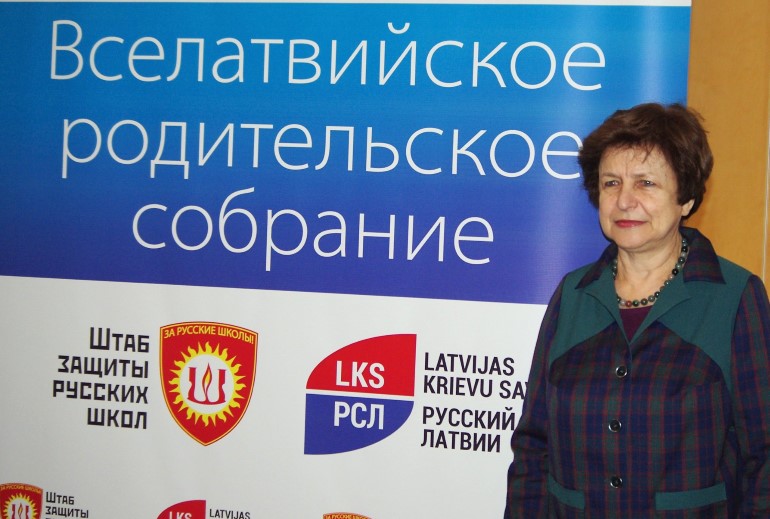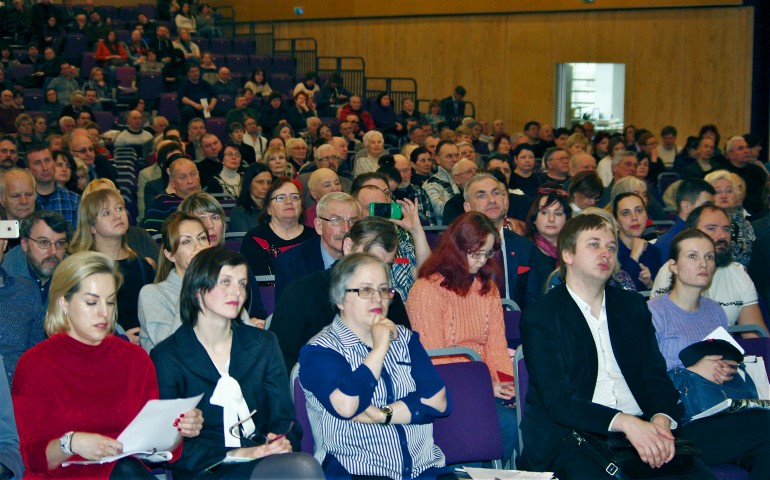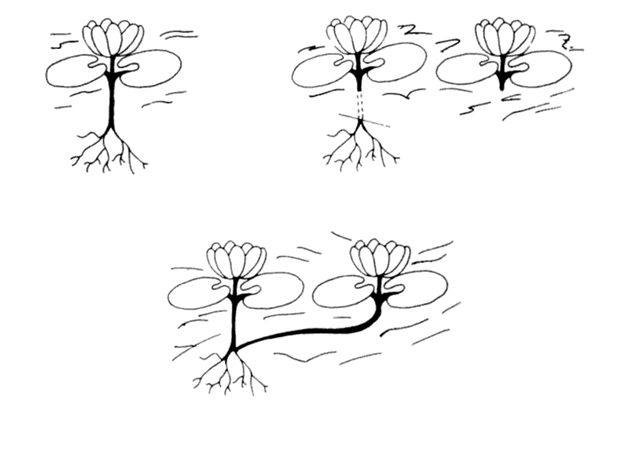Tatiana Zhdanok
Around a thousand people took part in the All-Latvian parents’ meeting in Riga. Parents, teachers, principals of Russian schools, local governments’ and Euro Parliament’s deputies, both Russians and Latvians are persuading the country’s government to stop the reform aimed at banning the Russian language from schools. Here is the report made at this meeting by a well-known human rights activist Tatiana Zhdanok, one of the leaders of the Russian Union in Latvia.
To be or not to be? – That’s Hamlet’s question that we are facing today. We must oppose what is happening to us by our will, our persuasion and our power.
What is happening in Latvia is nothing but a linguistic genocide.
Tatiana Zhdanok. Picture: Russian Union of Latvia/Facebook
The term is not mine, but a linguistic one. I heard it two years ago for the first time at the European Parliament’s inter-fractional group’s meeting devoted to the rights of traditional national minorities and their languages.
The speaker was Tove Skutnabb-Kangas, PhD and the professor of several Finnish, Swiss and Danish universities, the author of over 50 books and 400 articles, a recognized expert in linguistic rights and a fighter against discriminating national minorities. Tove had been invited to our today’s meeting but was unable to come due to health issues. Nevertheless, I will be using some of her materials in this article with the author’s permission.
The linguistic capital of people speaking the minority languages is often ignored and even looked upon as a disadvantage. This happens in Latvia, this happens in some other European countries. This way it is depreciated and becomes inconvertible.
Private but important issue of education is languages of teaching.
The linguistic capital of the national minorities is often ignored and even looked upon as a disadvantage. This happens in Latvia, this happens in some other European countries. This way it is depreciated and becomes inconvertible. What can we convert capital into? Capital is converted into power, as a rule.
Command of a language should ideally be considered as LINGUISTIC CAPITAL, an important and valuable resource. Unfortunately, it is not so in our country. Latvia recognizes the command of the national language and the command of the English language (and a few other languages of cross-cultural communication) as a linguistic capital, whereas the mastery of national minorities’ languages is depreciated.
Let’s consider the term the status authority. The status authority is power based somebody’s position in the society. President, a company’s director, a general, a deputy – they all have rights based on their social status. Administration of educational institutions also has authority over children.
When the minorities’ languages are not officially recognized, they become invisible artificially and their command is thought to be a disadvantage, not a resource. In this case, the mastery of such languages is not converted into any kind of status authority. I believe, you will agree that this is exactly what is happening in Latvia.
All-Latvia parents’ meeting. Picture: Russian Union of Latvia/Facebook
How does the government achieve this?
They subdue consciousness by three techniques: GLORIFICATION, STIGMATIZATION and RATIONALIZATION. I head these terms from Tove two years ago. My qualification is mathematics, I am not a specialist in social sciences, though I am familiar with pedagogics for I have taught at university for 15 years. So, when I first heard these terms and their definition I realized that they were the secret weapon owned and applied by the authorities against the whole nation. For instance, they are used by the language inspection, which should better be called the inquisition.
So, the first thing the government does is GLORIFYING the national majority, its language, culture, norms, traditions, persuasions, administrative institutions and the level of its social development. I think you will agree that this is exactly what is happening in Latvia.
At the same time, STIGMATIZATION of national minority is taking place, which means that its language, culture, norms, traditions, persuasions, the level of its development and human rights are depreciated. This way the people belonging to such minority are seen as retarded, unable to adapt to the modern post-modernist society and incapable of bringing up their own children. We are well aware of the juvenile justice methods, which provide for taking away national minorities’ children, practiced in many European countries.
And finally, the government is trying to RATIONALIZE the above described techniques and their actions from the view point of economics, politics, psychology, education, social science and linguistics, so that the very fact that all the authority is in the hands of the majority was perceived as a logical and favorable consequence for the minority.
The most important linguistic right of a person is the right to get education in their national language and the indisputable right for free primary and secondary education in state schools. The curriculum should, of course, include the study of the majority's language, but only as one of the subjects taught by bilingual teachers.
What happens when the minorities' languages are not recognized and looked upon as a disadvantage? How does the youngsters' attitude towards their parents, their language and culture, their knowledge, their norms and their ethics and religion change? Does the government want the young people to look down on their parents, be ashamed of them and refuse to study their language and their culture?
If the government achieves this goal, the national minorities will lose their linguistic, cultural and educational capital and, consequently, their opportunities.
How can we oppose this?
Experts believe that the most important linguistic right of a person is the right to get education in their national language and the indisputable right for free primary and secondary education in state schools. The curriculum should, of course, include the study of the majority's language, but only as one of the subjects taught by bilingual teachers for at least 6-8 years, preferably more.
However, we can see that in many cases the official language is taught at schools SUBTRACTIVELY, at the disadvantage of native languages, but not ADDITEVELY, in addition to them. This is progressively happening in Latvia.
SUBTRACTIVE teaching is done in the dominating language, which substitutes national languages for children. ADDITIVE education is done in the native languages, while the dominating language is taught at a good level as the second language, thus making the children bilingual and improving their language proficiency.
The idea behind subtractive teaching is assimilation, while additive teaching leads to social integration.
Let me illustrate this point with the following picture, which was used by the author I am quoting.
Picture: Tatiana Zhdanok/Facebook
What is the native language? Our expert proposes the following abstract definition of this notion. The native language is the skin. The second language is the tight jeans the child is wearing. First, the child feels uncomfortable, he is adjusting to the jeans, meaning that he is beginning to learn the language. Then the jeans are getting looser, the child starts to feel comfortable wearing them. Though, no matter how comfortable the jeans are, they are not your skin, they are something additional.
You are looking at the image of a water lily. The roots are hidden, there is just a beautiful flower on the surface. The flower in the first picture has roots and a flower. This lily may be compared to a well-developed native language of the child. What happens when the development of the native language is aborted? The root is cut off, and another language replaces it. Here is the second picture. The flower in the picture will remain beautiful for some time, and the second flower, the second language will appear next to it, but neither of them will have roots. As we all know, only the flower fed by the root grows, and the root is only the native language. That is why we want our children in Latvia to develop as shown in the third picture. The native language grows from the root and a new flower, the beautiful flower of the second language develops based on it. This picture illustrates well developed bilingual environment.
What is the native language? Our expert says that the native language is the skin. The second language is the tight jeans the child is wearing. First, the child is uncomfortable; he is adjusting to the jeans, meaning that he is beginning to learn the language. Then the jeans are getting looser, the child starts to feel comfortable wearing them. Thought, no matter how comfortable the jeans are, they are not your skin, they are something else.
CONCLUSIONS:
1) Subtractive education for the children of national minorities in the dominating language:
- Prevents children from getting education due to linguistic, pedagogical, psychological barriers which it creates, thus violating the children's right for education
- Often reduces the development of the children's abilities thus forcing them into poverty (see the works of the Nobel prize winner in economics Amartya Sen)
- Contradicts the results of serious studies on how to achieve a high level of bilingual and multi lingual communication and increase children's performance at schools.
2) From the point of view of society, psychology, economics and politics teaching in a foreign language causes a lot of psychological harm, i.e. social dislocation, psychological, cognitive, linguistic misplacement and consequently partial economic, social and political marginalization. It can also cause physical damage such as alcohol addiction, suicide, violence.
3) On the other hand, satisfying people's linguistic rights stops linguistic genocide, promotes integration and protects people from forced assimilation, popularizes positive state policy towards national languages and prevents conflicts.
These are conclusions of experts. As you see, they are absolutely different from the statement we hear in this country from the authors of the reform. The full scope of false statements is listed, for example, in the letter marked with Latvian coat of arms, which has recently been received by the co-chairman of our political group in the European Parliament "Green/European Free Alliance". The letter is signed by the Latvia’s Permanent Representative to the EU. It is the answer to the parliament’s suggestion to send the Latvian law draft on education for review to Venice Commission of European Council (the suggestion had been made in January, before the Latvian Parliament reviewed the law), because, in their opinion, the law contradicted Latvia's obligations to protect the rights of national minorities undertaken by it on entering the EU. Reasoning stipulated in the answer is false. In particular, it says that almost all the national minorities' organizations and parents support the law draft. We can easily prove this wrong. We will do so by today's meeting and this resolution. The only thing we can't yet prove wrong is the statement that all the principals of Russian schools approve of the reform. In conclusion, I would like to address them.
Friends, we all know what is at stake and what is happening now. The time of courage has come and we must summon our courage to stay brave.
I am addressing the principals of 95 Russian schools in Latvia. Look what is at stake! It is either the fate of our children and future generations or your personal career interests. Don't say you care for the children. As far as the children are concerned, it will be linguistic genocide for this is exactly how world-famous experts define it. At least one of you, please raise your voice in our support. This will be an act of civil courage on your side. We, the citizens of Latvia, will not forget this. Do it! Do it for the sake of eternity and generations to come!
Source: page of Tatiana Zhdanok/Facebook










